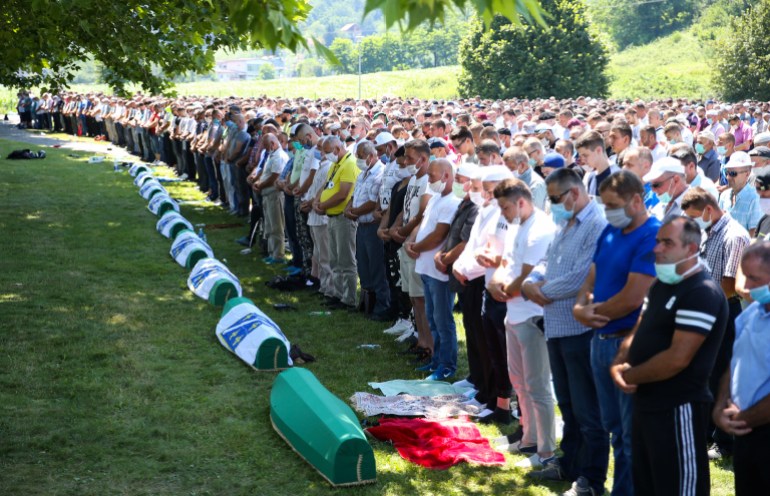Today, Saturday, Turkish President Recep Tayyip Erdogan warned against leniency towards speeches that fuel anti-Islam and support xenophobia in the West, and this comes as Bosnia and Herzegovina marks the 25th anniversary of the Srebrenica massacre committed by the Serbian forces against thousands of Muslims.
In a pictorial speech in which he participated in the commemoration of the massacre in which 8,000 Bosnian Muslims were executed by the Serbs in July 1995, Erdogan said that negligence with these speeches was a major concern for the future.
He added that intellectual, ethnic, cultural and sectarian differences should not be allowed to be a cause of hostility between people.
He pledged to pursue the perpetrators of crimes and massacres against the Bosnian Muslims, and to stand with the families of the victims in the search for justice, saying, "We will not forget our martyrs, and we will not forget the genocide in Srebrenica."
The Turkish president pointed out that despite this tragedy, European politicians have not learned any lessons from the Srebrenica massacre, stressing that there are great responsibilities for states and international organizations in order not to repeat such crimes and massacres.
He also said that despite a quarter of a century after the massacre, its pain is still fresh, referring to the mass graves that recall the horror of what happened in Srebrenica.
It is noteworthy that, during the past years, Erdogan has been participating in activities to commemorate the massacre with leaders and officials from other countries.
Memory of the massacre
The Republic of Bosnia and Herzegovina marked the 25th anniversary of the Srebrenica massacre, which comes in light of the spread of the Coruna epidemic, which has reduced the number of visitors and arrivals to the city.
Incidentally, the remains of a number of newly identified victims were buried in Potocari, on the outskirts of Srebrenica.
A limited number of the families of the victims participated in the commemorative events because of Corona, and this did not prevent many Bosnians from praying to the victims in the Potocari cemetery.
So far, 7,000 victims of the massacre have been identified through DNA tests, while more and more mass graves are discovered.
With a quarter of a century passed since the massacre, the families of the victims are still searching for the remains of their relatives, and demanding the prosecution of the perpetrators of the largest genocide in Europe after World War II.
Among the Serb leaders who have been tried on charges of war crimes, crimes against humanity and genocide in Bosnia at the War Crimes Tribunal for the former Yugoslavia: former President Slobodan Milosevic and the military commander Ratko Mladic.
It is noteworthy that the Serbian forces led by Mladic entered Srebrenica on July 11, 1995 after declaring it a safe area by the United Nations.
During the days of the horrific massacre in the city, the Serbian forces committed the ages of the victims between 7 and 70 years, after the Dutch forces working there within the United Nations forces handed over tens of thousands of Bosnians to the Serbian forces, which presented the Dutch with accusations of complicity in the crime.

